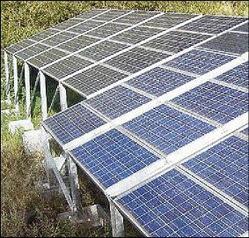John Myers Jr, Business Reporter

Dr Paul Jennings, CEO of the Jamaica Dairy Development Board, has submitted his solar energy plan to the Government for consideration. - Andrew Smith/Photography Editor
A local researcher has crafted a $2 billion renewable energy plan, which he is now selling to Government on the basis that it could generate country savings of up to four times the cost of implementation.
Dr Paul Jennings is proposing that photovoltaics, the process of capturing and redistributing energy harnessed from the sun, be adopted for residential use islandwide, saying it could save the country $8.1 billion annually.
But right now, what Jennings has is the idea. Funding is the next hurdle, which is why he has placed the plan before energy minister Clive Mullings in the hope that government will adopt it.
One-year moratorium
It was not immediately clear what reception the plan has got, but Jennings' proposal seems well timed given the Government's current drive to build out a renewable energy sector.
Last week, for example, Prime Minister Bruce Golding announced a $1 billion loan fund for the development of such projects.
The loans which are capped at $2 million, with a possible revision to $15 million, will be allocated through approved financial institutions - commercial banks, credit unions, the PC Bank and micro and small business lending institutions - at an interest rate of 10 per cent over a six-year period, with a one-year moratorium on principal repayments.
Jennings said his photovoltaic system could be built out islandwide within five years, while payback would come from revenues to be earned from subscribing households.
The cost will be heavy, at about $1.4 million per household willing to switch from JPS's oil-driven electricity supply.
The monopoly power supplier has an estimated 560,000 customers, the majority of whom are in the residential category.
OFFSETTING COSTS
"Assuming that this is adopted by the wealthiest quintile of householders, and contributes to a net 50 per cent reduction in their consumption from the national grid, this programme could potentially contribute to annual savings on fuel imports of the order of $2.75 billion and approximately $4.5 billion in savings at the household level," the researcher outlined in his proposal. His calculations related to 2006.
Jennings, who is the CEO of the Jamaica Dairy Development Board, a state agency, argues further that his residential photovoltaic system would free the national grid of supplying homes on the renewable grid, freeing JPS to prioritise investments to meet the needs of commercial and indus-trial customers.
He suggests that the cost to the householders could be offset through a 15-year mortgage
financing programme administered by the National Housing Trust, which could be funded by a mixture of loans and grants from the World Bank's Global Environ-ment Facility.
He also projects income of US$6.5 million (approximately $440 million) from the sale of carbon credits under the United Nations Framework Convention on Climate Change.
"Satisfying household require-ments for electricity from solar energy is seen not only as an effective means of reducing the national cost of electricity generation, but also as a significant contributor to reducing the emission of green-house gases," Jennings said.
GREAT DEMAND
JPS's electricity generation currently peaks at just over 800 megawatts, but demand is expected to outstrip supply by 2011, based on the country's energy consumption curve.
Based on JPS figures, Jennings calculates that the average residential customer consumes about 2,159 kilowatt hours (kWh) of electricity annually at a cost of $20.92 per kWh.
However, with the photovoltaic system, which the researcher said would have a lifespan of 30 years, that cost would be reduced to about $14.34 kWh, an estimated output of 3,300 kWh annually.
john.myers@gleanerjm.com

An array of photovoltaic panels. - Contributed

